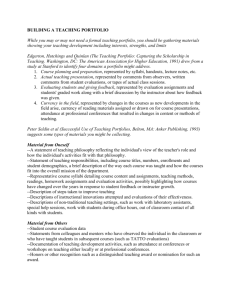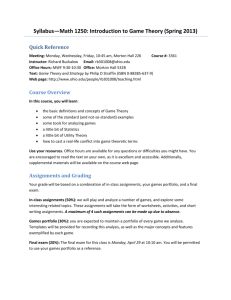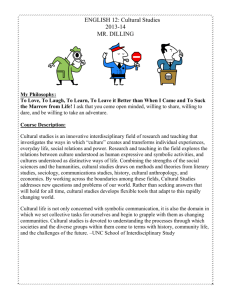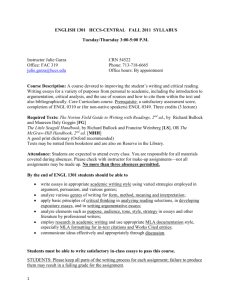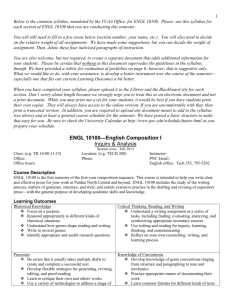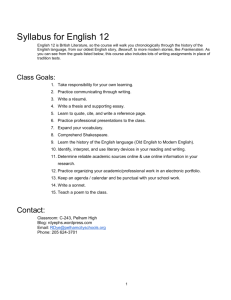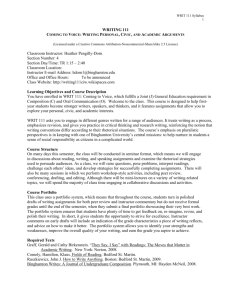English 11/12
advertisement
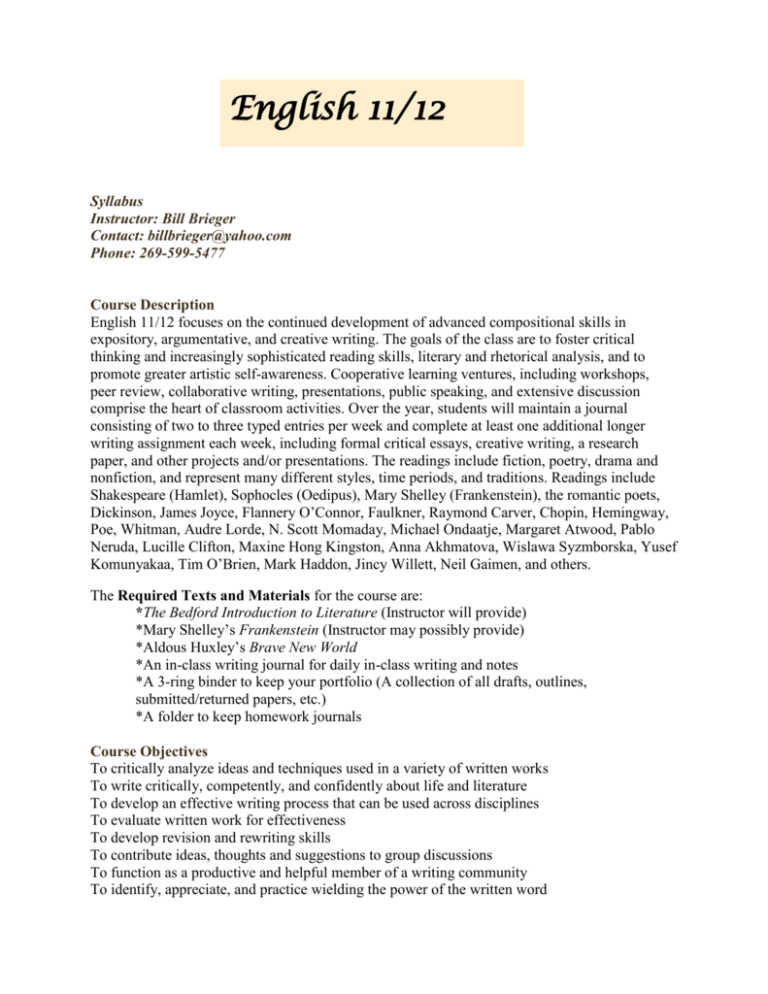
English 11/12 QuickTime™ and a TIFF (Uncompressed) decompressor are needed to see this picture. Syllabus Instructor: Bill Brieger Contact: billbrieger@yahoo.com Phone: 269-599-5477 Course Description English 11/12 focuses on the continued development of advanced compositional skills in expository, argumentative, and creative writing. The goals of the class are to foster critical thinking and increasingly sophisticated reading skills, literary and rhetorical analysis, and to promote greater artistic self-awareness. Cooperative learning ventures, including workshops, peer review, collaborative writing, presentations, public speaking, and extensive discussion comprise the heart of classroom activities. Over the year, students will maintain a journal consisting of two to three typed entries per week and complete at least one additional longer writing assignment each week, including formal critical essays, creative writing, a research paper, and other projects and/or presentations. The readings include fiction, poetry, drama and nonfiction, and represent many different styles, time periods, and traditions. Readings include Shakespeare (Hamlet), Sophocles (Oedipus), Mary Shelley (Frankenstein), the romantic poets, Dickinson, James Joyce, Flannery O’Connor, Faulkner, Raymond Carver, Chopin, Hemingway, Poe, Whitman, Audre Lorde, N. Scott Momaday, Michael Ondaatje, Margaret Atwood, Pablo Neruda, Lucille Clifton, Maxine Hong Kingston, Anna Akhmatova, Wislawa Syzmborska, Yusef Komunyakaa, Tim O’Brien, Mark Haddon, Jincy Willett, Neil Gaimen, and others. The Required Texts and Materials for the course are: *The Bedford Introduction to Literature (Instructor will provide) *Mary Shelley’s Frankenstein (Instructor may possibly provide) *Aldous Huxley’s Brave New World *An in-class writing journal for daily in-class writing and notes *A 3-ring binder to keep your portfolio (A collection of all drafts, outlines, submitted/returned papers, etc.) *A folder to keep homework journals Course Objectives To critically analyze ideas and techniques used in a variety of written works To write critically, competently, and confidently about life and literature To develop an effective writing process that can be used across disciplines To evaluate written work for effectiveness To develop revision and rewriting skills To contribute ideas, thoughts and suggestions to group discussions To function as a productive and helpful member of a writing community To identify, appreciate, and practice wielding the power of the written word Tentative Schedule Units Unit 1: Unit 2: Unit 3: Unit 4: Unit 5: Unit 6: Unit 7: Unit 8: Unit 9: Unit 10: Unit 11: Unit 12: Themes Discussion of Summer Reading Surprises, Epiphanies, Revelations Love or Something Like It Family (Including Hamlet & Oedipus) Lyrics Analysis Literature of War Research/Argumentation Papers Gothic Literature Romantic Poetry Frankenstein Brave New World Media Analysis & Creative Writing Policies and Requirements I refer you to the standard Rules and Responsibilities memo that was mailed to you. To reiterate briefly: Papers and homework: Due at the beginning of class. Late work is not acceptable. Professionalism: This is your willingness to take part in class activities, help others, arrive to class on time, meet schedules for assignments, and basically contribute to the community of the class. Student Expectations: *Thoughtful, thorough, and timely completion of all assignments *Close, careful reading of all the material *Energetic participation and respectful attentiveness during class *Conduct in keeping with university surroundings *Articulation of ideas, beliefs, and opinions *Respect for the ideas, beliefs, and opinions of others *Communication. If something is affecting your class performance, please let me know and we can work on it together. Remember that I’m here to help you—keep in touch with me about your concerns, frustrations, suggestions, struggles, ideas, and triumphs. Never hesitate to ask for help. Assignments Weekly Writings: Short 2-4 page papers and/or creative exercises will be assigned each week. These will receive the following marks: + (excellent); √+ (Strong); √ (Fair); √- (Weak). These assignments must be typed, 1.5 spacing, using 12 point Times Roman (or similar) font, and printed before class. Journals: You will receive (usually) three journal assignments each week. Some will be directed and others free (you can write about anything you wish). Each entry should reflect at least 30 minutes of work and be at least one page in length, single-spaced, using appropriate font. Unit Essays: At the conclusion of each unit, students will hand in a formal essay related to the technique or topic studied in that unit. The essays will be longer and more polished than the weekly writings. Students will peer edit/workshop these essays and will rewrite them. Vocabulary: As you read (both for class and not), type a running log of unfamiliar words you encounter. The list should contain the word, the definition, and the sentence you found it in. Your list should have at least ten words per week. Title each list properly. For example: Vocab for Week #3. Portfolio: All assignments, papers, exercises, outlines, revisions, previously graded papers with my comments, and other class materials should be kept in a portfolio. I will collect portfolios at the end of each semester so I can look at all of your work as a whole before assigning a course grade. Grade Calculation: Portfolio: 70% Participation (online and in class): 15% Quizzes, presentations, in class assignments: 15%


